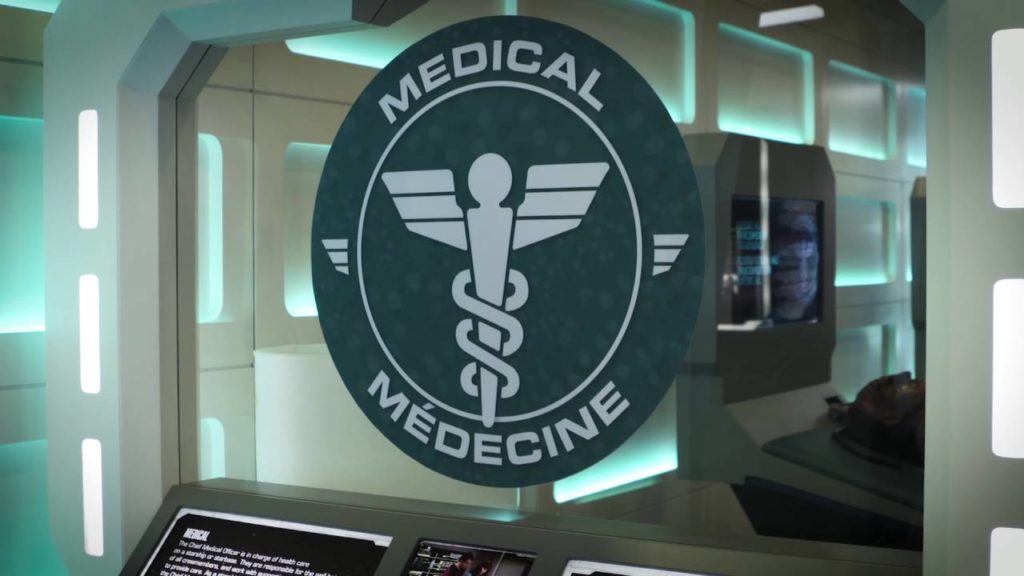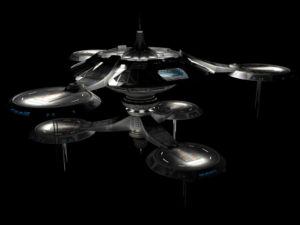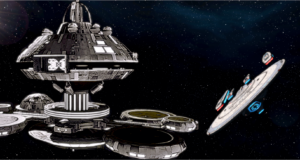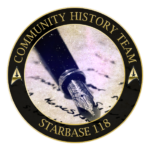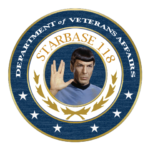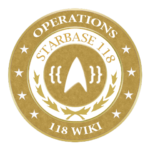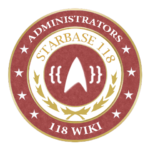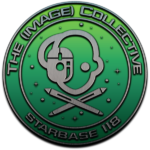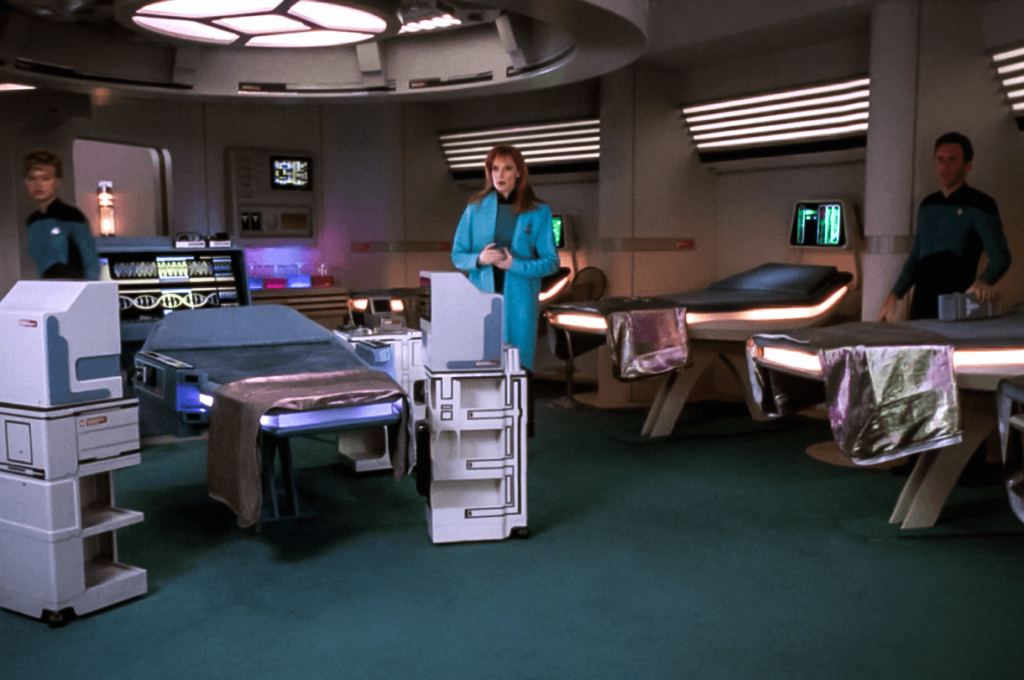
One of the most rewarding aspects of simming in the SB118 fleet is the incredible diversity of roles available, ranging from helm and medical to diplomacy and marines. This series shines a spotlight on that diversity by delving into each role and sharing insights from those within the fleet who have experienced them firsthand. In this edition, we explore the medical role. This includes all those who work in some form of health care, including doctors and nurses. Counsellors and mental health will have their own ‘role in focus’ article soon.
Aboard a ship, starbase, or planet-side colony, medical personnel provide day-to-day medical care, and treat injuries just like any other doctor. Their main responsibility is the physical well being and health of the crew and civilians on board their ship or base. They are also responsible for low-level sickness care. In crisis situations, this quickly changes and expands anywhere from low-level injury care to high-level surgery.
The Chief Medical Officer (CMO) co-ordinates the efficient running of the Medical department and is responsible for the activities of the personnel therein. It is the CMO’s job to ensure that the medical personnel are organized to ensure maximum productivity and also provide maximum medical and emergency response cover for the ship.
However, there’s much more to this position. To gain deeper insight, we reached out to some of our fleet’s dedicated simmers.
What do you enjoy the most about the medical role?
When asked what they love most about playing a medical officer, the most common response was that their characters are grounded in science. Many of the simmers expressed a passion for researching real-world medical journals to infuse their sims with authenticity. Dr. Madison Marsh of Starbase118 Ops encapsulates this sentiment perfectly:
“I enjoy the fact that my character is in a role that makes me truly analyze and use reasoning to uncover sound solutions to the many problems that doctors have to solve on a daily basis.”
The simmers also highlighted the unique interactions they have with the crew, noting how they are positioned to help fellow players tell their stories. Dr. Alix Harford of Denali Station elaborated:
“Playing a doctor lets me interact with all of the different characters. Instead of mostly writing with players in my field or specialty, I have lots of interaction with everyone. It also allows me to write with a different relationship with those characters. As a doctor, I get to ask questions that let me sort of interview the other players, really getting to know the characters they are writing. I also get to fulfill a support role.”
Sevantha Saa of the USS Astraeus expanded on this unique perspective:
“I enjoy medical roleplay due to the experience that a medical character brings to any scene they’re a part of and how they can help enrich others’ experiences tenfold through their performance. They are individuals who get to view the vulnerabilities of many characters who may not initially show it, which makes it a really neat position to be in roleplay-wise.”
Why did you pick the medical role?
The most common reason cited by our simmers for choosing the medical role was their enjoyment of “healer” positions in other games. Talia Ohnari of the USS Khitomer shared:
“I always play healers in any DnD or video game, so it was fitting.”
Some simmers were inspired by medical dramas, with one even citing Dr. Bashir as a role model. LtJG Gila Sadar elaborated:
“Seeing Dr. Bashir able to order the First Officer around expressly because he was concerned for her health was pretty darn cool.”
One simmer described how this role provided a sense of wish fulfillment. Dr. Toz of the USS Octavia E. Butler reflected:
“As a kid, I really wanted to be a nurse. My best friend became a nurse. But the hands-on nursing role was too blood-soaked for me. So, doctor it had to be. I also have an NPC that’s a nurse, so I have the best of both worlds.”
Yet, many cited the challenge of the medical role as a motivating factor, pushing them to grow as authors.
What is the most difficult part of playing a medical role?
Almost all the simmers noted that while the role is challenging, it is a rewarding challenge. Dr. Quentin Beck of the USS Ronin highlighted this aspect:
“I am not in the field at all, so I have to do some research, especially with jargon.”
LtJG Gila Sadar described how this difficulty has broadened her own knowledge:
“…actually learning surface-level medical lingo. I’m a perfectionist, so actual medical journals have suddenly found themselves in my Google searches.”
Dr. Madison Marsh added:
“Some sims can take longer than others because you have to conduct research in medical and biological sciences in an attempt to be as authentic as possible. You have to be prepared to think critically and come up with an abundance of technobabble fillers in dialogue.”
What advice or guidance would you give anyone who might want to play a medical officer?
Dr. Quentin Beck led the most common piece of advice, echoed by nearly every simmer surveyed:
“Ask questions. Lots of questions. There are a number of good resources on the wiki as well.”
Talia Ohnari pointed to Memory Alpha but added a caveat:
“But make it work; don’t just copy and paste. Also, don’t worry—your Google history is going to look super weird from now on.”
With this in mind, LtJG Gila Sadar offered a warning:
“Never let perfectionism intimidate you into not simming. I promise, everyone in your crew would much rather you have fun and advance the story in a meaningful way rather than get hung up on minor inconsistencies in your medical lingo.”
Dr. Alix Harford suggested adding depth to your character:
“Multi-class” your character. Design your doctor to have a special interest or secondary field of expertise. This allows you to engage more easily in scenes where no one needs to be patched up!”
Sevantha Saa emphasized the importance of focusing on the injured character:
“My belief is that as long as you are working to complement the injured character and plot positively, and making sure the medical scene remains about the injured patient in the initial struggle, you’ve done the hardest part.”
However, she also cautioned against neglecting your own character development
“It’s a balancing act when writing a scene to ensure you aren’t denying your own characterization while also not making the patient’s suffering or experience centric to your own. There are moments to shine in a medical scene, but doctors/medicals/healers really shine when they ensure the scene is about their patient, their recovery, and the aftercare. That bond between doctor and patient is a wonderful collaborative effort between players to experience.”
So perhaps this has persuaded you to give the medical role a try. Don’t forget to check out the wiki page for the medical role and if you’ve yet to join us, head over to https://www.starbase118.net/.
A heartfelt thank you to Michelle / LtJG Gila Sadar, Quentin Beck’s player, Lucas, Roxanna, writer for Talia Ohnari, Dr. Alix Harford of Denali Station, Dr. Toz, Klingon hybrid, Lynn (Sevantha Saa), Dr. Madison Marsh – Assistant Chief Medical Officer – Starbase 118 & the USS Narendra, and an anonymous respondent for their contributions to the survey.

